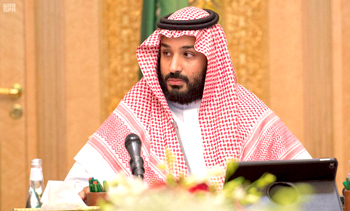Riyadh, Nov 8: Saudi Arabia will pay by next month the money it owes private companies, a committee headed by Deputy Crown Prince Mohammed bin Salman said Monday.
 “The council came up with a package of solutions and procedures to settle the dues that met the requirements of spending,” SPA reported after a regular meeting of the Council of Economic and Development Affairs.
“The council came up with a package of solutions and procedures to settle the dues that met the requirements of spending,” SPA reported after a regular meeting of the Council of Economic and Development Affairs.
Solutions “will be implemented immediately and completed before December 2016,” it said, in a discussion of the delayed payments.
The council discussed “the necessary procedures to pay the amounts owed to the private sector from the public treasury,” SPA said.
“The payment was late due to the sharp decline in oil revenue and the measures taken by the Kingdom to reduce spending on a number of projects.”
SPA added that priorities were rearranged according “to impact and efficiency,” but there had been “obstacles to implement the procedures.”
The arrears have left foreign workers, chiefly in the construction sector, struggling for months while they await back wages, AFP reported.
In April, the deputy crown prince announced a wide-ranging plan for economic diversification and social change in the coming years.
Saudi Arabia has taken a series of measures, including subsidy cuts, reductions in Cabinet ministers’ salaries and delays in major projects.
According to SPA, billions of riyals have been saved by rescheduling and modifying contracts, while “a large number” of projects were stopped, saving tens of billions more.
Early last month Saudi Binladin Group said the government had transferred some payment in the previous two weeks, allowing it to cover some back wages to its remaining staff.
The company had already finished payments to around 70,000 laid-off workers.





Comments
Add new comment